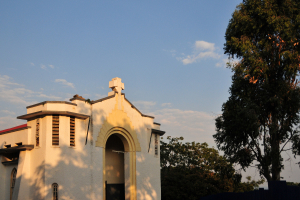Prince Charles Opens Interfaith Venue
Prince Charles launched a new venue in London Thursday to be used as a meeting place for members of different religions to explore common challenges and undertake scriptural exploration with a view to fostering peace and reconciliation.
LONDON – Prince Charles launched a new venue in London Thursday to be used as a meeting place for members of different religions to explore common challenges and undertake scriptural exploration with a view to fostering peace and reconciliation.
The goat-hair Bedouin tent from Saudi Arabia has been set up on the grounds of the former St Ethelburga’s Church, which was rebuilt after an IRA bomb destroyed most of the building in 1993.
Prince Charles returned to unveil the new venue this week following the inauguration of the rebuilt church as a centre for peace and reconciliation in 2002.
He told the various faith representatives gathered for the launch that there was a need for understanding as different religions attempt to “explain the nature of mystery,” Agence France-Presse reported.
The heir to the British throne said that with greater understanding of different religions, “we might perhaps reduce the level of conflict and violence and misunderstanding.”
He also urged the multi-faith audience not to “overdo the way in which we decide that we know everything.”
The Bishop of London, the Rt Rev Richard Chartres, who was among the audience said, "Part of the gospel agenda in London is to find fresh ways of relating to our neighbors who practice other faiths. An introverted and fearful church is a poor witness to Jesus Christ.
"It is in this spirit that a new meeting place is being opened this morning at the St Ethelburga Centre by the Prince of Wales,” he continued. “Our intention at St Ethelburga’s is to create ‘a big tent’ where all can feel at home and where the role of host can be assumed by different people in turn.”
The venue has been established in order to allow Jews, Christians and Muslims to come together to explore some of the contemporary challenges common to the three major faiths as well as to conduct research into the Torah, Bible and Quran to gain wider understanding and inspiration.
The Bishop of London stressed, however, that the interfaith work would not in any way compromise the distinctiveness of the three faiths.
“While the encounter is not polemical there is no covert agenda which minimizes the differences between faiths. In the case of the three faiths which in different ways look back to Abraham it is our common conviction that there is no ‘fourth position’ from which our faiths can be seen as mere local editions of some universal spiritual truth,” he said.
“Syncretism is not the agenda and indeed the experience of scriptural reasoning for a Christian is often to sharpen the sense of the uniqueness of the incarnation as well as identifying much common ground.”
In addition to Chartres, the launch was also attended by Chief Rabbi Sir Jonathan Sacks and representatives of the Baha'i, Buddhist, Jain, Zoroastrian, Hindu, Sikh and Muslim faiths.
Support also came in from notable figures unable to attend the event, including U2’s Bono, who said the tent project “is taking a crucial lead in starting a historic conversation” that pitches the three main religions “in terms of what they have in common.”
Other words of support and encouragement came from Desmond Tutu and former U.S. president Bill Clinton, who said, “Today we have an unprecedented opportunity to weave a strong fabric from diverse threads and build a multiracial, multicultural and multiethnic international society.”
Clinton went on to describe “The Tent” as a “wonderful step toward encouraging others to embrace our diversity, respect our differences, and unite around our shared dreams and values.”




























